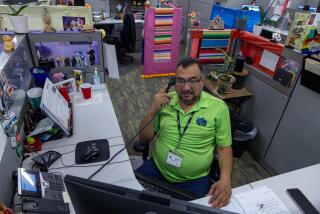To Earn More, Speech-Language Expert Should Broaden Client Base
If Bella Panchal were to produce a movie about her recent work life, she might call it “The Incredible Shrinking Paycheck.”
Over the last three years, the 38-year-old speech-language pathologist has watched her annual income dwindle from more than $100,000 to about half that. It’s not that she has lost clients, cut back hours or been lax about sending bills. Rather, she’s been walloped by drastic cutbacks in Medicare reimbursement rates and squeezed by the financial belt-tightening of her health-care employers.
“Every day I still get calls [for employment], but they don’t pay anything near what I used to make,” Panchal said. “Before, I made $98 to $120 an hour. Today, for the same services, I’m getting offered $28 to $35 an hour.”
Panchal is not alone in her woes. Across the country, speech-language pathologists, or SLPs, have been leaving their jobs at skilled nursing facilities and nursing homes. Some report that they can no longer support themselves and their families on their clinical SLP earnings, according to a 1999 American Speech-Language Hearing Assn. study.
Panchal loves her vocation, but is becoming convinced that remaining in it may not be economically feasible. She helps support her parents and 28-year-old brother at their Fullerton home, so she hopes to find a way to boost her income as soon as she can.
Recently, Panchal has considered returning to school, perhaps part time, to study software engineering, which she believes would be a lucrative vocation. She also is contemplating becoming a full-time chef. She has completed courses at the Orange County School of Culinary Arts and works part time on weekends at the Hyatt Newporter as a cook.
For guidance, Panchal consulted Walnut Creek, Calif.-based career counselor Diana Brim. Brim questioned Panchal closely about her motivations for abandoning her profession. Panchal emphasized that she was doing so reluctantly, for she greatly enjoys working with patients. “I love to see that I can help them,” she said.
Brim asked Panchal to momentarily put aside her alternative career considerations. “What I’m leading up to is that I’m not convinced you should give up your profession,” Brim said. “I’d hate to see you throw it aside, when you’ve invested so much time and money in it. Instead, perhaps you can do some career revamping.”
The counselor explained the concept of “composite careers” to Panchal. Panchal has been working almost exclusively with skilled nursing facilities and nursing homes, which are hard-hit by budgetary restraints. By broadening her client base, she could get more work (at possibly higher rates) from universities, schools, hospitals and other institutions.
At Brim’s mention of university work, Panchal paused, then said, “You know, my original goal in life was to get a PhD.”
Panchal told Brim she did not pursue this route because, after doing some investigating, she discovered that no schools in California offered doctoral programs in her specialty areas. (Panchal is certified both in speech pathology and audiology.) She also told Brim that the thought of taking on potentially huge student loan debt troubled her.
Brim encouraged Panchal to reconsider the doctorate path, for its financial price would be an investment in her future.
“You’re at an age where you’ll have plenty of time to recoup that money,” Brim said.
Here are some suggestions from Brim and other experts:
* Build a composite career. Panchal won’t have trouble finding new clients. The sister fields of speech-language pathology and audiology are plagued by the same problem: Jobs are going begging.
School districts in urban centers are offering signing bonuses to SLPs, said Richard Hurtig, head of the University of Iowa’s department of speech pathology and audiology in Iowa City. Hospitals are launching national--and even international--recruiting campaigns to nab applicants. Academic posts for faculty in communication disorders departments are, in some cases, remaining unfilled.
“There is right now a tremendous shortage--only to get worse--in terms of filling those academic positions,” Hurtig said.
In coming years, these problems may worsen. As America’s aging population increases, so will its demand for hearing and speech-language professionals, said Theresa Chisolm, co-director of the University of South Florida’s audiology department in Tampa. Federal mandates for newborn hearing screening programs will further exacerbate the talent shortage.
Schools, facing a surge of Generation Y students, are increasing salaries to attract more qualified SLPs. And “option schools” for deaf children are trying to recruit SLPs to work with growing numbers of students who have received cochlear implants, said Kathy Sussman, director of the Jean Weingarten Peninsula Oral School for the Deaf in Redwood City, Calif.
The bottom line is that Panchal can explore these various opportunities to assemble a satisfying “composite career” for herself.
Panchal also may wish to market her speech and audiology services to corporations. A small but growing number of corporate speech pathologists are educating firms’ employees about how to improve their communication effectiveness, overcome speech problems and become better public speakers, said Katie Schwartz, owner of Business Speech Improvement in Chattanooga, Tenn.
* Obtain doctorate. Panchal is correct that no California universities offer clinical doctoral programs in audiology or speech-language pathology . But she may be glad to learn that San Diego State University and the University of San Diego offer a joint doctoral program in language and communicative disorders. Obtaining this credential would enable Panchal to become part of a university research team, perhaps studying topographic brain mapping, language disorders and more. She’d also be able to teach at four-year institutions.
Should Panchal be interested in pursuing an audiology doctorate, she need not leave home to do so. By 2007, new audiologists will be required to obtain these advanced degrees to practice. Audiologists who have master’s degrees and are already working will be encouraged to enroll in distance-learning programs to stay up-to-date and competitive. Both Central Michigan University (https://www.cel.cmich.edu/aud) and the Pennsylvania College of Optometry School of Audiology (https://pcoonline.org/index.real?action) already offer such online programs.
With an audiology doctorate, Panchal may be able to get involved in genetics-related research , study the effects of aging on auditory function and even conduct hearing-aid development research.
“You’ve really given me some good ideas to look at,” Panchal told Brim. “I’m going to start making some phone calls. I’ve got quite a bit to think about now.”
More to Read
Sign up for Essential California
The most important California stories and recommendations in your inbox every morning.
You may occasionally receive promotional content from the Los Angeles Times.










